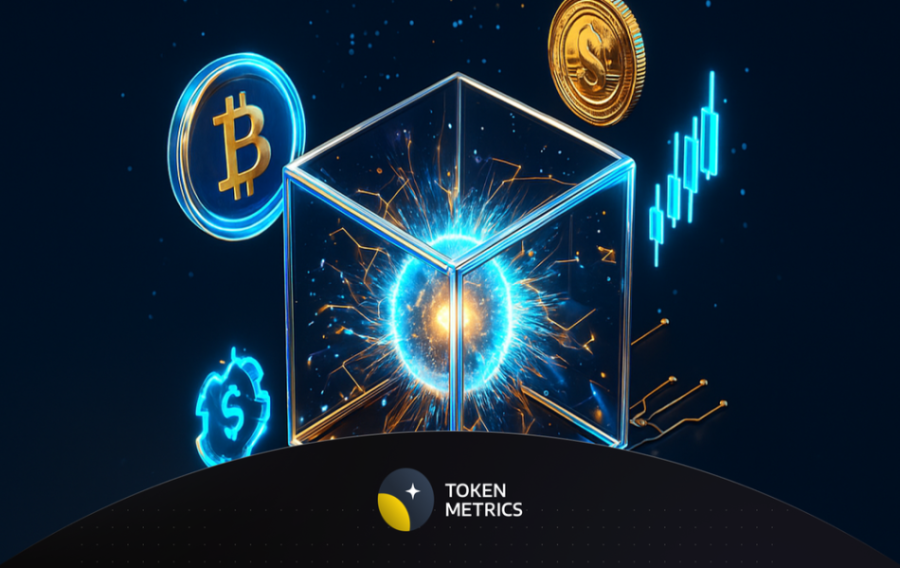A Comprehensive Guide
The world of finance has always been a playground for innovation. From the gold standard to cryptocurrencies, each era has ushered in a transformative way of looking at money and transactions.
Now, in the digital age, there’s a buzz about the Quantum Financial System (QFS). Let’s dive into this fascinating topic and decipher how it works.

Token Metrics Daily Pulse
Get Crypto Insights Delivered Daily
What is the Quantum Financial System?
The Quantum Financial System, or QFS, is a proposed new-age financial system that leverages the unique capabilities of quantum computing.
Quantum computers use the principles of quantum mechanics, a branch of physics that describes the tiniest particles in our universe, to process massive amounts of data at speeds previously deemed impossible.
In simple words, the QFS represents a paradigm shift in the world of finance, aiming to integrate the groundbreaking capabilities of quantum computing into our monetary systems.
At its core, the QFS utilizes principles from quantum mechanics, particularly quantum entanglement and quantum cryptography, to create a financial system that offers unparalleled security and real-time transaction speeds.
Unlike traditional systems where data breaches and hacks are concerns, any interference in the QFS alters the quantum state of data, instantly signaling a security threat. Moreover, its decentralized nature mirrors that of blockchain, reducing the control any single entity might have.
As the QFS promises a transparent, speedy, and ultra-secure financial landscape, it’s capturing the keen interest of industry insiders and stakeholders.
Key Features of the QFS
Security: One of the biggest selling points of the QFS is its unparalleled security. Thanks to quantum cryptography, it becomes near impossible for hackers to infiltrate the system.
Speed: With quantum computers, transactions are processed in real-time, eliminating the need for intermediaries and reducing transaction times.
Transparency: The system is believed to be fully transparent, ensuring all financial activities are visible, thus reducing corruption and fraudulent activities.
Decentralization: Just like blockchain technology, the QFS aims to operate in a decentralized manner, preventing any single entity from gaining full control over the system.
How Does the Quantum Financial System Work?
The QFS working process is relatively straightforward –
Quantum Entanglement: At the heart of QFS is the phenomenon called quantum entanglement. This allows particles to become interconnected and the state of one (like spin direction) can instantly influence the state of another, no matter the distance separating them. This plays a role in creating a secure and instant communication system in QFS.
Quantum Cryptography: Security in the QFS is reinforced by quantum cryptography. Any attempt to eavesdrop or intercept information changes the quantum state of the information, immediately alerting the system.
Integration with Existing Systems: It’s expected that QFS would not operate in isolation. Instead, it will likely be integrated with current financial systems and blockchain technologies to ensure a seamless transition and interoperability.
The Role of Cryptocurrencies in QFS
With the rise of cryptocurrencies like Bitcoin and Ethereum, many speculate how they would fit into the QFS. Given the decentralized nature of both blockchain and QFS, there’s potential for significant synergy.
Cryptocurrencies might benefit from the enhanced security features of the QFS, ensuring more robust protection against hacks and unauthorized transactions. The immense speed of quantum computing could also address some scalability issues faced by current blockchain networks.
Advantages of Quantum Financial System
Unparalleled Security – At the heart of the QFS is quantum cryptography. Unlike traditional systems, where breaches can go undetected, any unauthorized attempt to access QFS data immediately changes its quantum state, alerting the system. This intrinsic property makes infiltrations almost impossible.
Near-Instantaneous Transactions – Quantum entanglement, a phenomenon where particles become interconnected regardless of distance, is a foundation of the QFS. It ensures transactions occur in real-time, obliterating typical global financial delays.
Decentralized Framework – Drawing inspiration from blockchain, the QFS operates without a central authority. This decentralization ensures transparency and reduces the potential for undue influence or manipulation by any single entity.
Enhanced Transparency – Owing to its decentralized nature, all transactions within the QFS are visible, creating an open system that reduces the chances of fraudulent activities and fosters trust among its users.
Potential Challenges and Criticisms
Technological Maturity: Quantum computers are still in their infancy. While there’s rapid progress, widespread application in sectors like finance might still be years away.
Implementation: The shift from traditional financial systems to a new, untested one will be massive. Regulatory, technological, and practical challenges will need to be addressed.
Public Trust: Just as with cryptocurrencies, gaining the public’s trust to move away from traditional banks and systems they’re familiar with will be an uphill battle.
When will the Quantum Financial System Start?
The initiation of the Quantum Financial System (QFS) is a topic of intense speculation within the financial community. As of now, while quantum computing has made significant strides, it’s still in developmental stages, and a full-fledged QFS remains on the horizon.
The transition from our current systems to QFS will require robust technological maturity, regulatory adjustments, and widespread trust.
Though exact timelines are uncertain, continuous advancements suggest that the next decade might witness substantial progress towards its implementation.
How to Invest in the Quantum Financial System?
Investing in the Quantum Financial System (QFS) demands an informed and strategic approach due to its emerging nature. A key perspective to consider is the rising belief among investors that ISO 20022-compliant cryptocurrencies will be instrumental in the QFS framework.
As such, diversifying your portfolio to include these specific cryptocurrencies could provide potential market exposure to the QFS. Alongside this, it’s beneficial to research and invest in companies leading in quantum computing and blockchain innovations.
Subscribing to credible financial news sources will highlight timely opportunities. Before making any commitments, engaging with financial advisors is essential to ensure your investments match your risk appetite and financial objectives in this evolving landscape.
Future Outlook of QFS
The Quantum Financial System (QFS) is positioned at the crossroads of innovation and potential disruption in the financial sector.
With its promise of unmatched security through quantum cryptography and blazing transaction speeds owing to quantum mechanics, many view it as the inevitable future of finance.
Coupled with the integration of ISO 20022-compliant cryptocurrencies, the system embodies a blend of transparency and efficiency.
However, the full realization of QFS depends on technological advancements, regulatory adaptations, and public trust. The coming decade is poised to be transformative, with QFS potentially redefining the global financial landscape.
Frequently Asked Questions
Q1. What differentiates the Quantum Financial System from traditional banking systems?
The QFS employs quantum computing principles for heightened security and real-time transactions, distinguishing it from conventional systems that rely on classical computing techniques.
Q2. Is the Quantum Financial System hack-proof?
While no system can claim absolute invulnerability, QFS’s use of quantum cryptography makes unauthorized data breaches extremely challenging, as any interference immediately alters the system’s quantum state.
Q3. How will the QFS impact everyday banking for consumers?
Once implemented, consumers can expect faster transaction speeds, increased security, and potentially lower fees due to the reduced need for intermediaries.
Q4. Are there any potential risks or downsides to the QFS?
Like any emerging technology, QFS will face teething issues, including potential technological limitations, the need for new regulations, and initial public skepticism.
Q5. Will QFS replace blockchain technology or work in tandem with it?
The QFS is inspired by blockchain’s decentralization principles. While it can function independently, it’s believed that both technologies can coexist and complement each other, especially in creating transparent financial systems.
Q6. How will international trade and cross-border transactions benefit from QFS?
QFS promises real-time global transactions without typical delays, making international trade more efficient and potentially reducing transaction costs.
Q7. What is ISO 20022, and why is it significant in the context of QFS?
ISO 20022 is a standardized messaging protocol for electronic data interchange between financial institutions. Its compliance in cryptocurrencies indicates a move towards creating a unified and efficient global financial communication system, aligning with the principles of QFS.
Q8. How can one prepare for the transition to the QFS?
Staying informed about advancements in quantum computing and blockchain, understanding ISO 20022-compliant cryptocurrencies, and seeking advice from financial experts can help individuals and businesses smoothly navigate the shift to QFS.
Conclusion
The Quantum Financial System is indeed a revolutionary concept, promising heightened security, swift transactions, and a level of transparency previously unimagined.
But, as with all innovations, it’s essential to approach it with a critical mindset. Understanding its workings, potential, and challenges can help stakeholders make informed decisions.
As the financial world braces for yet another transformation, only time will tell if the QFS will redefine our economic landscape or remain an aspirational concept. For now, let’s keep our ears to the ground, stay informed, and be ready to adapt to the ever-evolving world of finance.
Disclaimer
The information provided on this website does not constitute investment advice, financial advice, trading advice, or any other sort of advice and you should not treat any of the website’s content as such.
Token Metrics does not recommend that any cryptocurrency should be bought, sold, or held by you. Do conduct your own due diligence and consult your financial advisor before making any investment decisions.

Want more insights like this?
The Daily Pulse delivers crypto market insights, top token picks, and on-chain signals — every morning, completely free.
No spam. Join 10,000+ crypto investors. Unsubscribe any time.






